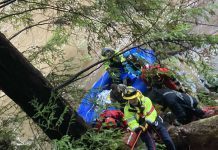
The 2024 presidential election is one to remember, but Santa Clara County residents also faced a rare local decision: choosing a successor to longtime 16th Congressional District Representative Anna Eshoo, a Democrat who held her seat for over three decades.
This election was special to me, as I got to work on a radio and podcast story called, “Having a Voice Without a Vote,” an episode of KALW’s teen podcast, *tbh*. This piece, which focused on my passion for environmental activism and policy, aired on the NPR-member station in early September.
As a 17-year-old resident of San Jose, I care about our district’s representation because I’m passionate about protecting our region’s stunning natural landscape—our grasslands, beaches and redwood forests. But, with persistent wildfire seasons, sea-level rise and pollution, these spaces are at risk. I wanted to know what each candidate would do to safeguard these areas and address climate issues.
Eshoo’s 31-year tenure made this race especially significant, as her successor would likely shape District 16’s climate policy for years to come as well.
I’m also exploring the possibility of a career in journalism, so I decided to pursue those twin interests this summer by pitching a story about the candidates’ proposed environmental policies to KALW’s Summer Podcasting Institute.

I was thrilled to be accepted. We began reporting right away from their San Francisco office. I was nervous about interviewing politicians – wanted to stay objective and gather as much truth as possible. But, I pushed forward with the mentorship of my editor Sarah Lai Stirland, an experienced campaign and policy reporter who has worked in Washington, DC. The Los Gatos resident has covered many politicians on Capitol Hill, is a KALW Audio Academy alum, and has contributed to the Los Gatan.
It wasn’t easy to land interviews, but I eventually reached former San Jose Mayor Sam Liccardo. I was surprised, since his campaign manager began our interaction by grilling me on how large KALW’s audience was. Additionally, he wasted no time telling me that Democratic State Assemblyman Evan Low, Liccardo’s rival in the race, took money from PG&E. (Low has pointed out that he’s supported legislation to require California to source its energy completely from clean energy by 2045.)
Before I spoke with Liccardo, I interviewed my preferred candidate, Joby Bernstein, a 28-year-old Department of Energy analyst and a graduate of Stanford Business School. His entire platform was driven by economics and the environment.
He lost in the primary. Yet, I remained incredibly inspired by both his youth and his love for nature. I wanted to learn more about his policy ideas: My plan was to then run them past Liccardo and Low.
Liccardo said that he did consult Bernstein on the environment in a subsequent interview. He also explained how coastal erosion and wildfires are some of the main issues plaguing this district. When I asked how young people could get involved in environmental policy, he admitted it wasn’t something he considered often. He also emphasized how personal relationships matter more than ever at a time when the internet is full of misinformation and institutional trust is at an all time low.
“We certainly can communicate within our families and among our friends (who may be able to vote) to inspire and urge them to get more engaged,” he told me. “What I’ve learned…is that people trust what they’re seeing and hearing online less and less. What spurs us to action are those people in our lives who are our friends, our family—those people we respect and trust. And they are much more persuasive than what we’re seeing on the internet.”
I was eager to connect with Assemblymember Low, as he attended Leland High, my school. But I couldn’t reach him.
Instead, I asked Bay Area youth activists how they try to influence policy. I joined a park cleanup organized by Cupertino High School students, attended a youth-led environmental justice summit in Oakland and interviewed members of the Silicon Valley Youth Climate Action team. These young leaders inspired me with their proactive efforts to educate communities and drive change.
When it came time to record my episode, I had found my answer. Youth can have an impact by volunteering, educating one another and speaking at council meetings. We are the next voting generation, so our concerns matter. My episode not only amplified youth voices but also showed me that I, too, can have a voice without a vote by asking candidates questions and educating my community.
Our district’s new representative could make a lasting difference, and I hope those who can vote have done so. For those under 18, I hope my story inspires you to engage with the issues that matter to you, just as I did with environmental policy.
Antara Gangwal is a 17-year-old senior at Leland High School in San Jose.









